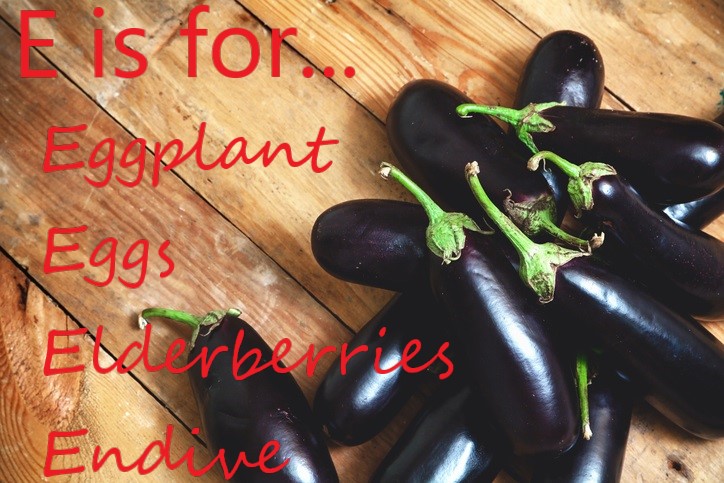Healthy Alphabet: E is For…Four Foods that are Good For You
by Karen Rollins May 6, 2019

We are constantly bombarded with information about what we should and shouldn’t be eating which can become confusing.
Yello has decided to go for a simple approach and provide an alphabetical guide to some of the healthiest foods you can add to your diet.
We’ll be going from A-Z and listing up to five fruits and vegetables that are packed with minerals and vitamins while also providing nutritional facts on their health benefits.
We’ve already covered A, B, C and D so now let’s get on to E.
Eggplant (also known as aubergine)
Eggplant is a member of the nightshade family and is related to the potato and tomato, although it is actually a fruit. It is rich in fibre, low in calories and provides a range of nutrients and antioxidants.
There are several varieties of eggplant ranging in colour and size but the most common is egg-shaped, large and purple/ black in colour.
Eggplants are a versatile food which can be roasted, grilled or fried.
Nutrition facts (1 medium sized eggplant):
– 132 calories
– 18.6 grams of fibre (75% of daily value (DV))
– 12.9 grams of sugar
– 5.5 grams of protein (11% DV)
– 1.5 milligrams (mg) of Pantothenic Acid
– 19.2 micrograms (mcg) of vitamin K (24% DV)
– 12.1 mg of vitamin C (20% DV)
– 121 mcg of folate (30% DV)
Eggs
Eggs are a quick, cheap and easy meal choice and can be used in a variety of ways whether you prefer them scrambled, poached or as an omelette.
Despite concerns about a link between egg yolks and high cholesterol, recent guidelines suggest they have a minimal effect on cholesterol levels, and it’s safe to eat up to 12 eggs a week as part of a healthy and balanced diet.
Nutrition facts (1 large fried egg):
– 90.2 calories
– 7.0 grams of fat (11% DV)
– 6.3 grams of protein (13% DV)
– 0.2 mg of riboflavin (14% DV)
– 0.6 mcg of vitamin B12 (11% DV)
– 23.5 mcg of folate (6% DV)
– 335 IU of vitamin A (7% DV)
– 15.7 mcg of selenium (22% DV)
Elderberries
The elderberry is a black berry found on bushes in Europe and Asia. It has various health benefits and is an especially good source of vitamin C and dietary fibre.
Elderberry is also one of the most commonly used medicinal plants in the world and is said to be useful as a supplement to treat cold and flu symptoms.
Elderberries can be quite tart and need to be cooked to be eaten. The flowers have a delicate aroma and can be eaten raw or cooked, they are also sometimes used in beauty products to reduce the look of fine wrinkles.
Nutrition facts (100 grams):
– 73 calories
– 18.4 grams of carbohydrates
– 7 grams of dietary fibre (28% DV)
– 36.0 mg of vitamin C (60% DV)
– 600 IU of vitamin A (12% DV)
– 0.2 mg of vitamin B6 (11% DV)
– 1.6 mg of iron (9% DV)
– 280 mg of potassium (8% DV)
Endive
Endive is closely related to and often confused with its cousin, chicory. There are two main varieties of endive: Belgian endive and curly endive.
Belgian endive is a small head of cream-coloured, tightly packed leaves which taste refreshing but slightly bitter. It’s grown in complete darkness to prevent it from turning green.
Curly endive grows in loose heads of green-rimmed, lacy outer leaves that curl at the tips. Both types of endive have nutritional benefits and are an abundant source of manganese as well as vitamins A and K.
Nutrition facts (1 head):
– 87.2 calories
– 6.4 grams of protein (13% DV)
– 15.9 grams of dietary fibre (64% DV)
– 11116 IU of vitamin A (222% DV)
– 33.3 mg of vitamin C (56% DV)
– 728 mcg of folate (182% DV)
– 1185 mcg of vitamin K (1481% DV)
– 2.2 mg of manganese (108% DV)
Watch out for the rest of the healthy food alphabet in this series to be published on Find Yello, and click to take a look at the previous A, B, C and D articles.
Sources: The Food Coach / BBC Good Food / Healthline / Genius Kitchen / Huffington Post / Organic Facts / Nutrition Data








